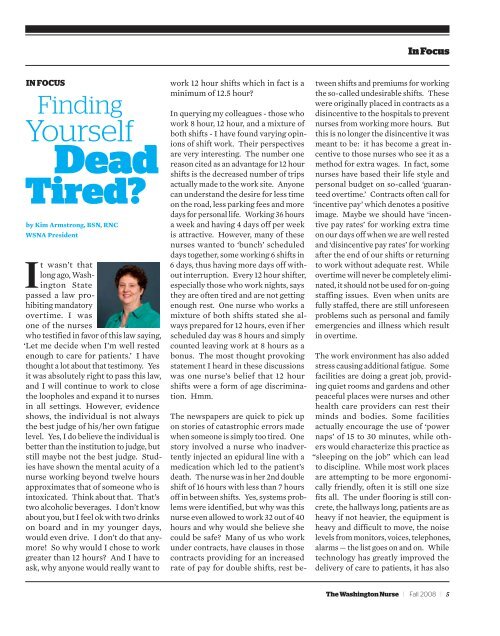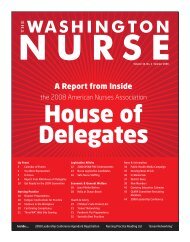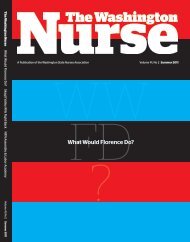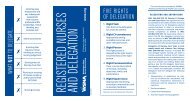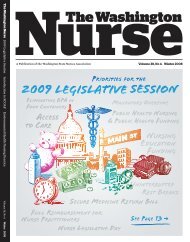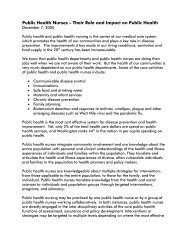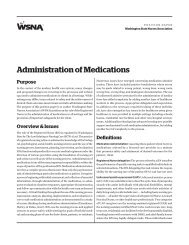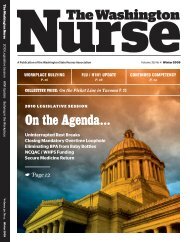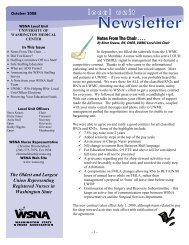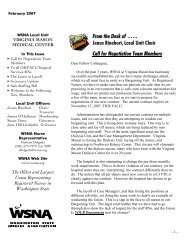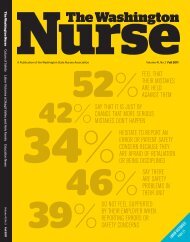Issue 38.3 - Fall 2008 - The Washington State Nurses Association
Issue 38.3 - Fall 2008 - The Washington State Nurses Association
Issue 38.3 - Fall 2008 - The Washington State Nurses Association
You also want an ePaper? Increase the reach of your titles
YUMPU automatically turns print PDFs into web optimized ePapers that Google loves.
In Focus<br />
in focus<br />
Finding<br />
Yourself<br />
Dead<br />
Tired<br />
by Kim Armstrong, BSN, RNC<br />
WSNA President<br />
It wasn’t that<br />
long ago, <strong>Washington</strong><br />
<strong>State</strong><br />
passed a law prohibiting<br />
mandatory<br />
overtime. I was<br />
one of the nurses<br />
who testified in favor of this law saying,<br />
‘Let me decide when I’m well rested<br />
enough to care for patients.’ I have<br />
thought a lot about that testimony. Yes<br />
it was absolutely right to pass this law,<br />
and I will continue to work to close<br />
the loopholes and expand it to nurses<br />
in all settings. However, evidence<br />
shows, the individual is not always<br />
the best judge of his/her own fatigue<br />
level. Yes, I do believe the individual is<br />
better than the institution to judge, but<br />
still maybe not the best judge. Studies<br />
have shown the mental acuity of a<br />
nurse working beyond twelve hours<br />
approximates that of someone who is<br />
intoxicated. Think about that. That’s<br />
two alcoholic beverages. I don’t know<br />
about you, but I feel ok with two drinks<br />
on board and in my younger days,<br />
would even drive. I don’t do that anymore!<br />
So why would I chose to work<br />
greater than 12 hours And I have to<br />
ask, why anyone would really want to<br />
work 12 hour shifts which in fact is a<br />
minimum of 12.5 hour<br />
In querying my colleagues - those who<br />
work 8 hour, 12 hour, and a mixture of<br />
both shifts - I have found varying opinions<br />
of shift work. <strong>The</strong>ir perspectives<br />
are very interesting. <strong>The</strong> number one<br />
reason cited as an advantage for 12 hour<br />
shifts is the decreased number of trips<br />
actually made to the work site. Anyone<br />
can understand the desire for less time<br />
on the road, less parking fees and more<br />
days for personal life. Working 36 hours<br />
a week and having 4 days off per week<br />
is attractive. However, many of these<br />
nurses wanted to ‘bunch’ scheduled<br />
days together, some working 6 shifts in<br />
6 days, thus having more days off without<br />
interruption. Every 12 hour shifter,<br />
especially those who work nights, says<br />
they are often tired and are not getting<br />
enough rest. One nurse who works a<br />
mixture of both shifts stated she always<br />
prepared for 12 hours, even if her<br />
scheduled day was 8 hours and simply<br />
counted leaving work at 8 hours as a<br />
bonus. <strong>The</strong> most thought provoking<br />
statement I heard in these discussions<br />
was one nurse’s belief that 12 hour<br />
shifts were a form of age discrimination.<br />
Hmm.<br />
<strong>The</strong> newspapers are quick to pick up<br />
on stories of catastrophic errors made<br />
when someone is simply too tired. One<br />
story involved a nurse who inadvertently<br />
injected an epidural line with a<br />
medication which led to the patient’s<br />
death. <strong>The</strong> nurse was in her 2nd double<br />
shift of 16 hours with less than 7 hours<br />
off in between shifts. Yes, systems problems<br />
were identified, but why was this<br />
nurse even allowed to work 32 out of 40<br />
hours and why would she believe she<br />
could be safe Many of us who work<br />
under contracts, have clauses in those<br />
contracts providing for an increased<br />
rate of pay for double shifts, rest between<br />
shifts and premiums for working<br />
the so-called undesirable shifts. <strong>The</strong>se<br />
were originally placed in contracts as a<br />
disincentive to the hospitals to prevent<br />
nurses from working more hours. But<br />
this is no longer the disincentive it was<br />
meant to be: it has become a great incentive<br />
to those nurses who see it as a<br />
method for extra wages. In fact, some<br />
nurses have based their life style and<br />
personal budget on so-called ‘guaranteed<br />
overtime.’ Contracts often call for<br />
‘incentive pay’ which denotes a positive<br />
image. Maybe we should have ‘incentive<br />
pay rates’ for working extra time<br />
on our days off when we are well rested<br />
and ‘disincentive pay rates’ for working<br />
after the end of our shifts or returning<br />
to work without adequate rest. While<br />
overtime will never be completely eliminated,<br />
it should not be used for on-going<br />
staffing issues. Even when units are<br />
fully staffed, there are still unforeseen<br />
problems such as personal and family<br />
emergencies and illness which result<br />
in overtime.<br />
<strong>The</strong> work environment has also added<br />
stress causing additional fatigue. Some<br />
facilities are doing a great job, providing<br />
quiet rooms and gardens and other<br />
peaceful places were nurses and other<br />
health care providers can rest their<br />
minds and bodies. Some facilities<br />
actually encourage the use of ‘power<br />
naps’ of 15 to 30 minutes, while others<br />
would characterize this practice as<br />
“sleeping on the job” which can lead<br />
to discipline. While most work places<br />
are attempting to be more ergonomically<br />
friendly, often it is still one size<br />
fits all. <strong>The</strong> under flooring is still concrete,<br />
the hallways long, patients are as<br />
heavy if not heavier, the equipment is<br />
heavy and difficult to move, the noise<br />
levels from monitors, voices, telephones,<br />
alarms — the list goes on and on. While<br />
technology has greatly improved the<br />
delivery of care to patients, it has also<br />
<strong>The</strong> <strong>Washington</strong> Nurse | <strong>Fall</strong> <strong>2008</strong> | 5


